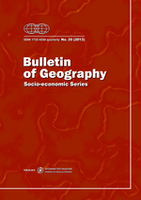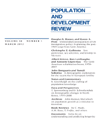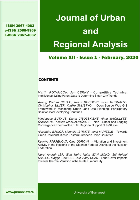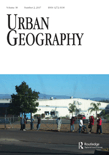
Espaces-Populations-Societes
Scope & Guideline
Fostering Understanding of Population Dynamics
Introduction
Aims and Scopes
- Mobility and Transportation Studies:
The journal analyzes various forms of mobility, including urban transport systems, active mobility strategies, and the implications of transportation choices on social equity and environmental sustainability. - Socio-spatial Dynamics:
Research published in the journal examines the socio-spatial dynamics of urban and rural areas, focusing on how demographic changes, migration patterns, and urban policies shape communities and territories. - Urban and Regional Planning:
The journal contributes to the discourse on urban and regional planning by investigating the impact of public policies on local development, housing, and revitalization efforts in small towns and peri-urban areas. - Social Vulnerability and Resilience:
There is a consistent focus on understanding social vulnerabilities, particularly in marginalized populations, and exploring resilience strategies in response to socio-economic and environmental challenges. - Cultural and Demographic Transformations:
The journal publishes research that delves into cultural shifts and demographic transformations, including fertility patterns, migration, and the effects of crises on family structures.
Trending and Emerging
- Active and Sustainable Mobility:
There is a growing emphasis on research related to active mobility, including walking and cycling, particularly in urban peripheries. This trend reflects a broader societal shift towards sustainable transportation and health. - Impact of the COVID-19 Pandemic:
The journal has seen an uptick in studies examining the effects of the COVID-19 pandemic on demographic trends, mobility patterns, and urban policies, showcasing its relevance in addressing current global challenges. - Socio-ecological Vulnerability:
Emerging themes related to socio-ecological vulnerabilities, particularly in small towns and rural areas, are gaining importance, indicating a shift towards understanding the interconnections between environmental issues and social dynamics. - Demographic Revitalization in Rural Areas:
Research focusing on demographic revitalization, especially in rural areas post-pandemic, has become a prominent theme, as scholars explore how crises can lead to unexpected demographic shifts. - Social Housing and Urban Revitalization:
The journal is increasingly publishing studies on social housing initiatives and their role in revitalizing small towns, reflecting a growing interest in housing policies as tools for social and economic development.
Declining or Waning
- Historical Demographic Studies:
There has been a noticeable reduction in papers focusing on historical demographic studies, such as those examining the impacts of past wars or long-term demographic changes, which were more prevalent in earlier volumes. - Global Environmental Impact Assessments:
Research dedicated to broad global environmental assessments and their demographic implications seems to be less frequent, indicating a shift towards localized studies and specific case analyses. - Urbanization and Gentrification Studies:
While still relevant, the frequency of papers specifically addressing urbanization and gentrification dynamics has decreased, possibly due to a growing focus on more nuanced local practices and community resilience.
Similar Journals

Geo UERJ
Exploring the Boundaries of Geography and InnovationGeo UERJ is a renowned open-access journal published by Universidade do Estado do Rio de Janeiro (UNIV ESTADO RIO JANEIRO), focused on the multifaceted study of geography and related disciplines. Established to foster innovation and disseminate high-quality research, Geo UERJ has been dedicated to making scholarly work accessible since its transition to open access in 2007. The journal aims to provide a platform for researchers, professionals, and students to share insights into geographical phenomena, environmental issues, and urban studies, contributing to the global discourse on sustainability and spatial analysis. Its publications serve as valuable resources for academicians looking to stay abreast of cutting-edge developments within the geography field. With the ISSN 1415-7543 and E-ISSN 1981-9021, Geo UERJ invites contributions from diverse perspectives, enriching the academic landscape with important geographic research from Brazil and beyond.

Bulletin of Geography-Socio-Economic Series
Enhancing understanding through interdisciplinary insights.Bulletin of Geography-Socio-Economic Series, published by Nicolaus Copernicus University in Torun, Poland, is a premier Open Access journal dedicated to enhancing interdisciplinary discourse within the fields of geography and socio-economics. Since its inception in 2003, the journal has garnered significant recognition, achieving a Q1 ranking in Cultural Studies and notable placements in other categories, affirming its impact on the academic community. The journal provides valuable insights and research findings with the aim of fostering a deeper understanding of socio-economic trends and their geographical implications. Its commitment to Open Access since 2008 underscores its dedication to disseminating knowledge widely, making it an essential resource for researchers, professionals, and students alike. With an accessible online format and a solid reputation reflected in its impressive Scopus ranks, the Bulletin of Geography-Socio-Economic Series plays a pivotal role in shaping contemporary discussions in social sciences, facilitating knowledge exchange across borders.

POPULATION AND DEVELOPMENT REVIEW
Bridging Research and Policy in Population Studies.Population and Development Review is a prestigious academic journal published by Wiley, recognized for its comprehensive exploration of the intersections between population dynamics and development processes. Since its inception in 1976, the journal has contributed significantly to the field, featuring rigorous peer-reviewed articles that address pressing issues in demography, development, and sociology, maintaining a commendable reputation with a Q1 ranking across multiple categories as of 2023. With an impact factor that reflects its influence—ranking in the 90th percentile in Sociology and Political Science, and 85th percentile in Development—this journal serves as a vital resource for researchers, policy-makers, and students alike. It is instrumental in fostering dialogue and disseminating knowledge that shapes and informs public policy and academic inquiry. Although not an open-access publication, it remains accessible through various academic institutions, ensuring that its valuable insights are available to a broad audience eager to engage with the complexities of population and development.

Revista INVI
Innovating Research to Shape Urban LandscapesRevista INVI, published by UNIV CHILE, is a prominent peer-reviewed academic journal dedicated to the fields of architecture and urban studies. With a commitment to open access since 1986, the journal plays a crucial role in disseminating high-quality research and innovative ideas that address pressing societal challenges related to housing, urban development, and spatial planning in Chile and beyond. As of 2023, it holds an impressive Q1 rank in architecture and a Q2 rank in urban studies, positioning it as a key resource within the academic community, reflected in its Scopus rankings where it ranks 60th out of 189 in its engineering architecture category and 140th out of 279 in social sciences, urban studies. The journal attracts a diverse range of contributors, from seasoned researchers to emerging scholars, ensuring a vibrant exchange of concepts and methodologies. By integrating interdisciplinary approaches and engaging with contemporary issues, Revista INVI not only enriches academic discourse but also contributes to informed policy-making and practice in the realm of urban and architectural development.

Journal of Urban and Regional Analysis
Innovating Insights into Territorial InteractionsWelcome to the Journal of Urban and Regional Analysis, a leading platform for scholarly research dedicated to the dynamic fields of urban and regional studies. Published by BUCHAREST UNIV PRESS and available through an open access model since 2009, this journal aims to disseminate innovative findings that explore complex interactions within urban environments. With an impact factor reflective of its solid academic standing, the journal proudly holds a Q2 quartile ranking in Urban Studies as of 2023, positioning it among the top-tier publications in the field. Based in Romania, the journal combines interdisciplinary approaches that cater to researchers, professionals, and students eager to contribute to and engage with the ongoing discourse surrounding territorial dynamics. By providing a platform for rigorous analysis and diverse perspectives, the Journal of Urban and Regional Analysis stands as an essential resource for anyone interested in the transformative processes shaping our urban landscapes.

Papeles de Poblacion
Connecting diverse perspectives in population dynamics.Papeles de Población, published by the Universidad Autónoma del Estado de México, is a prominent open-access journal that has been advancing the field of demography since its inception in 1997. With an ISSN of 1405-7425, this journal aims to foster a deeper understanding of population studies through research articles, reviews, and critical analyses that address the complex dynamics of demographic changes, social structures, and their implications. While currently ranked in the fourth quartile of its category in 2023, it serves as a significant channel for researchers, professionals, and students to disseminate and access cutting-edge findings. Open access since 2004, it provides a platform for broader readership and knowledge sharing, thus contributing to the global discourse on population issues. Based in Mexico, the journal is committed to embracing diverse perspectives, emphasizing the importance of regional studies within a global context.

URBAN GEOGRAPHY
Illuminating the Complexities of City LifeURBAN GEOGRAPHY, published by Routledge Journals, Taylor & Francis Ltd, is a leading interdisciplinary journal that has been at the forefront of urban studies since its inception in 1980. With an impact factor that positions it in the prestigious Q1 category in both Geography, Planning and Development and Urban Studies, this journal is recognized for its rigorous research that informs policy and practice in urban environments. With a Scopus ranking of #20 out of 279 in the field of Urban Studies and #79 out of 821 in Geography, Planning and Development, it offers valuable insights for scholars, professionals, and students alike—enhancing our understanding of the complex dynamics that shape urban spaces. URBAN GEOGRAPHY is pivotal for those looking to advance their expertise in urban analytical frameworks, urbanization trends, and sustainable development strategies. Submissions are welcomed from a diverse range of perspectives, making it a vital resource for anyone invested in the future of urban landscapes.

Urban Science
Fostering Inclusive Dialogues on Urban SustainabilityUrban Science, published by MDPI in Switzerland, is a pioneering open access journal that has been serving the academic community since 2017. With a robust focus on understanding urban environments through various interdisciplinary lenses such as Environmental Science, Geography, Planning and Development, and Urban Studies, this journal aims to advance knowledge on the complexities of urban living and the challenges that modern cities face. Recognized for its impact, Urban Science holds prestigious rankings, including Q1 in Urban Studies and Q2 in multiple relevant categories. Its presence in leading databases like Scopus, where it stands among the top percentile ranks, underscores its contribution to critical dialogues in urban research. The journal’s commitment to accessibility, targeted toward researchers, professionals, and students alike, fosters an inclusive platform for disseminating innovative ideas and solutions necessary for sustainable urban development.

Journal of Demographic Economics
Transforming Data into Insight for Sustainable DevelopmentThe Journal of Demographic Economics, published by Cambridge University Press, stands as a leading interdisciplinary platform dedicated to the exploration and advancement of research in the intertwined fields of demography, economics, and geography. With an impact factor that reflects its esteemed position—ranking in the Q1 quartile for Demography (2023)—the journal fosters scholarly dialogue through high-quality articles that elucidate the complex interactions between population dynamics and economic trends. Operating under an open access model, the journal ensures that its findings are widely accessible, promoting inclusivity and engagement among researchers, professionals, and students alike. The Journal of Demographic Economics endeavors to bridge gaps in knowledge by publishing innovative and rigorous studies, thereby contributing significantly to both theoretical frameworks and practical applications across various domains. Drawing submissions from a global audience, this journal not only enhances the understanding of demographic transitions but also informs policy decisions and socioeconomic development strategies, making it an essential resource for those invested in demographic and economic research.

Comparative Population Studies
Bridging gaps in population studies for informed policy-making.Comparative Population Studies is an esteemed open-access journal published by the BUNDESINSTITUT BEVOELKERUNGSFORSCHUNG in Germany, dedicated to advancing the field of demography. Since its launch and transition to open access in 2010, the journal has provided a platform for researchers to share innovative population studies, promoting a deeper understanding of demographic trends and patterns globally. With an impressive Q2 rank in Demography within the 2023 quartile categories and a commendable rank #61 out of 139 in Scopus' Social Sciences Demography classification, it plays a vital role in disseminating rigorous research. The journal covers a range of topics related to population dynamics, migration, and social implications, making it invaluable to academics, professionals, and students in the field. With an emphasis on comparative studies, Comparative Population Studies not only fosters scholarly dialogue but also enhances policy-making and economic planning. Located at Friedrich-Ebert-Allee 4, Wiesbaden 65185, Germany, the journal continues to be a prominent resource for those eager to engage with the latest demographic research.